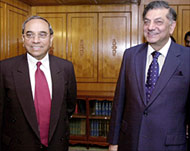India, Pakistan to resume talks in May
India and Pakistan will resume peace talks in May or June after three days of preparatory discussions went smoothly, Pakistani President Pervez Musharraf said on Wednesday.

Musharraf said foreign secretaries from the two countries would meet in May or June to launch a “composite dialogue” over several areas of dispute, with disputed Kashmir high on the agenda.
Foreign ministers would then meet in July or August, he said in an address to Islamic scholars.
“What has been decided is that in May/June there will be a composite level dialogue… soon after Indian elections, and in it the Kashmir issue will be discussed,” Musharraf said in the address in Islamabad.
“In July/August a foreign minister-level composite dialogue will take place and after that we will see.”
The two countries have gone to war three times since gaining independence in 1947 – twice over the Himalayan region of Kashmir which they both claim.
They were on the brink of a fourth war in 2002, four years after both conducted tit-for-tat nuclear tests.
Broad understanding
 |
|
Pakistan’s Foreign Secretary Riaz |
On Tuesday, middle-ranking foreign ministry officials from both sides said they had reached a “broad understanding” on the talks framework.
Pakistani Foreign Secretary Riaz Khokhar met Indian counterpart Shashank on Wednesday to finalise plans.
Essentially, the neighbours aim to take up where they left off when a composite dialogue over eight issues ran aground in 1999 and finally collapsed at a summit in the Indian city of Agra in July 2001.
“The process we started is moving forwards smoothly towards a solution,” Musharraf said, promising to take into account the wishes of Kashmiris in any solution to the 57-year-old dispute.
“It should be acceptable to India, Pakistan and the Kashmiris,” he said.
“But I promise I will not take any decision without taking the nation into confidence.”
Bid for peace
 |
|
The talks so far have involved |
Under the composite dialogue formula, foreign secretaries would discuss the Kashmir dispute, as well as “peace and security” – code for a range of confidence-building measures meant to reduce the risk of nuclear and conventional war.
Officials from other ministries would also tackle a range of issues, including trade and economic links, people-to-people contacts and disputes over water sharing, maritime boundaries and the Siachen glacier, the world’s highest battlefield.
Diplomats see signs that both sides genuinely want to make a fresh bid for peace and to avoid the pitfalls that have undermined previous attempts to mend their differences.
They also appear keen to maintain the momentum generated by last month’s meeting between Musharraf and Indian Prime Minister Atal Behari Vajpayee.
But Indian elections expected in April meant some delay was inevitable.
Nuclear security
Pakistan has proposed that the talks also consider proposals for a “strategic restraint regime”, so that both sides maintain a minimum nuclear deterrence and avoid a costly nuclear and conventional arms race.
|
“The process we started is moving forwards smoothly towards a solution. It should be acceptable to India, Pakistan and the Kashmiris. But I promise I will not take any decision without taking the nation into confidence” Pervez Musharraf |
More than a million troops were massed on the border in 2002 in a tense military confrontation sparked by an attack on India’s parliament that New Delhi blamed on Pakistani-backed militants.
Heavy US pressure helped to avert a war, and in November the two sides agreed to impose a ceasefire along the Line of Control dividing Kashmir. But mistrust runs deep.
India accuses Pakistan of supporting militants fighting its rule in Kashmir.
Although it says infiltration into Kashmir from Pakistan has slowed, it says Islamabad has not dismantled what it calls the “terrorist infrastructure” within its country.
For its part India has to allay Pakistani fears that it does not see the talks as a way of sidelining the Kashmir issue, and giving it time to crush a separatist insurgency there.